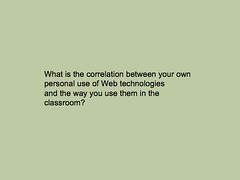The adopted curriculum might actually invite discussion and controversy if you study the curriculum document itself with students.and
My thinking is that if we take a critical stance toward curriculum, we can still use it, and at the same time question it’s content, viewpoint, assumptions, and relevance. Along the way we can teach what it intends for students to learn, and we can also think about why. Learning that’s embedded in a real social context stands a far greater chance of making sense than simply reading through a catalog of goals and objectives.I wrote the curriculum in my last job. And I never once shared it with my students. We never had that all-important discussion about why they were learning what they were learning. I never gave them the opportunity to question my assumptions or the curriculum's relevance. Not in any formal way, that is. We talked a lot about how we could improve the program, but we never did it in conjunction with the curriculum. I can only imagine what insight I might have gained if we had done that.
Many of my K-12 teacher friends struggle with a mandated curriculum that they feel doesn't allow them to do much real teaching. I wonder if Doug's ideas about sharing the curriculum with the students would help. Would it even be possible? As long as the curriculum is the enemy, it controls our lives. But if we make it our own, study it with our students as Doug suggests, maybe -- just maybe -- we can all learn something from it.




